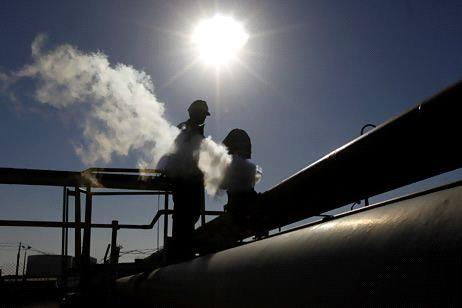Ammon News - DUBAI (The National) - US oil prices surged to a two-year high yesterday, as the market was rattled by the prospect of military intervention by western powers in Syria. Prices were also supported by outages in Libya and other producers and a rise in demand from recovering economies.
West Texas Intermediate, the benchmark for US crude, rose by more than US$3 to peak at about $112 a barrel, the highest since May 2011. The European crude benchmark Brent future also continued its rise, climbing by $3 to $117 a barrel before paring some of its gains.
The United States and the United Kingdom are moving closer to military strikes against Basher Al Assad's regime in response to alleged chemical attacks against rebel areas in Damascus last week.
Analysts believe the uncertainty over the scope of western action is pushing prices up. Both governments have suggested intervention would be confined to a short period of missile and air strikes and that ground forces would not be committed in an effort to dispose of the Assad regime. This could limit the effect on oil prices.
"The geopolitical risk has caused a little bit of a boost for the oil markets, but in the longer term it will not have massive implications," said Ross Strachan, an analyst at Capital Economics.
If the latest developments in Syria continue to concern the markets, strategic reserves could be deployed to stave off a dramatic spike in prices. "If we go to about $120 a barrel, the pressure to release strategic stocks would grow by the day," Mr Strachan said. Whereas the loss of about 300,000 barrels per day (bpd) of Syrian production could be compensated for, "the bigger risk for the oil market is the potential for the Syrian conflict to spread to neighbouring producing countries and imperil regional output", Barclays wrote in a research note. Further, strikes and tribal unrest in Libya have brought production crashing down from last year's average of 1.4 million bpd to what could be no more than 200,000 bpd today.
Together with the effect of international sanctions on Iran's oil sector and production declines in Iraq, South Sudan and Nigeria, about 2.8 million bpd of oil are not reaching the markets. At the same time, global demand has picked up as the economic outlook improves.
"We see more supply than demand for oil in this quarter. There is a strong fundamental reason to be bullish on oil," said David Wech, managing director at JBC Energy.
Markets were feeling the effect of the conflict yesterday and both the Dubai and Abu Dhabi bourses closed down.
